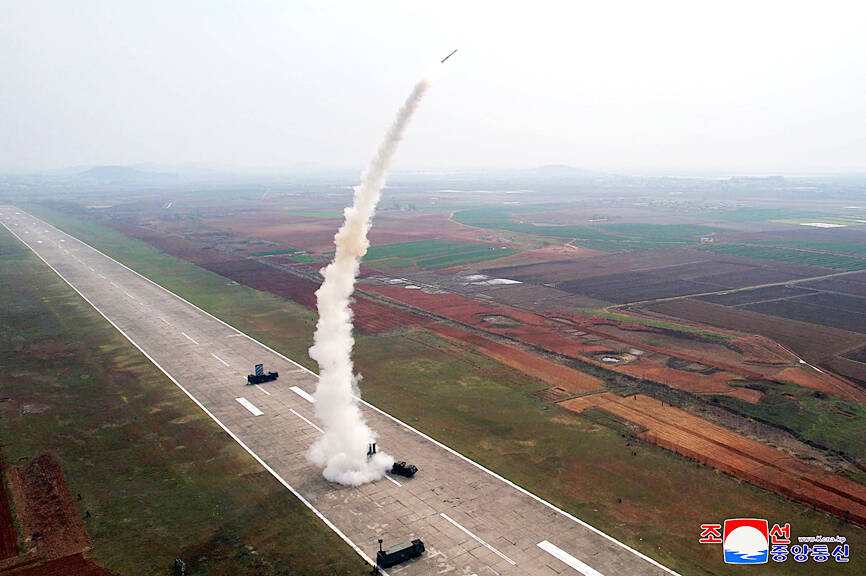North Korea has tested a “super-large warhead” designed for a strategic cruise missile, state media said yesterday, the most recent test since UN sanctions monitoring against the nuclear-armed nation was upended by Russia.
Russia last month used its UN Security Council veto to effectively end UN monitoring of violations of the raft of sanctions on Kim Jong-un’s administration for its nuclear and weapons program.
Analysts have said that North Korea could be testing cruise missiles ahead of sending them to Russia for use in Ukraine, with Washington and Seoul claiming Kim has shipped weapons to Moscow, despite UN sanctions banning any such moves.

Photo: KCNA via KNS / AFP
“The DPRK [Democratic People’s Republic of Korea] Missile Administration has conducted a power test of a super-large warhead designed for ‘Hwasal-1 Ra-3’ strategic cruise missile,” Korean Central News Agency said.
North Korea also carried out a test launch of a “’Pyoljji-1-2’ new-type anti-aircraft missile in the West Sea of Korea,” it said, adding that both tests were carried out on Friday afternoon.
Seoul’s military yesterday said it detected “several cruise missiles and surface-to-air missiles” fired toward the same body of water, also known as the Yellow Sea, at about 3:30pm on Friday.
It added that it was “closely watching” North Korean military activity, and if Pyongyang “commits a provocation, we will punish it overwhelmingly and resolutely.”
Ahn Chan-il, a defector-turned-researcher who is president of the World Institute for North Korea Studies, said that the test appeared to involve “a new type of solid fuel, and it seems to be part of the production of exports in response to Russian demand.”
Pyongyang said the tests were “part of the regular activities” of the country’s missile administration and had “nothing to do with the surrounding situation.”
A “certain goal was attained” through the tests, it added, without giving further details.

AIR SUPPORT: The Ministry of National Defense thanked the US for the delivery, adding that it was an indicator of the White House’s commitment to the Taiwan Relations Act Deputy Minister of National Defense Po Horng-huei (柏鴻輝) and Representative to the US Alexander Yui on Friday attended a delivery ceremony for the first of Taiwan’s long-awaited 66 F-16C/D Block 70 jets at a Lockheed Martin Corp factory in Greenville, South Carolina. “We are so proud to be the global home of the F-16 and to support Taiwan’s air defense capabilities,” US Representative William Timmons wrote on X, alongside a photograph of Taiwanese and US officials at the event. The F-16C/D Block 70 jets Taiwan ordered have the same capabilities as aircraft that had been upgraded to F-16Vs. The batch of Lockheed Martin

GRIDLOCK: The National Fire Agency’s Special Search and Rescue team is on standby to travel to the countries to help out with the rescue effort A powerful earthquake rocked Myanmar and neighboring Thailand yesterday, killing at least three people in Bangkok and burying dozens when a high-rise building under construction collapsed. Footage shared on social media from Myanmar’s second-largest city showed widespread destruction, raising fears that many were trapped under the rubble or killed. The magnitude 7.7 earthquake, with an epicenter near Mandalay in Myanmar, struck at midday and was followed by a strong magnitude 6.4 aftershock. The extent of death, injury and destruction — especially in Myanmar, which is embroiled in a civil war and where information is tightly controlled at the best of times —

China's military today said it began joint army, navy and rocket force exercises around Taiwan to "serve as a stern warning and powerful deterrent against Taiwanese independence," calling President William Lai (賴清德) a "parasite." The exercises come after Lai called Beijing a "foreign hostile force" last month. More than 10 Chinese military ships approached close to Taiwan's 24 nautical mile (44.4km) contiguous zone this morning and Taiwan sent its own warships to respond, two senior Taiwanese officials said. Taiwan has not yet detected any live fire by the Chinese military so far, one of the officials said. The drills took place after US Secretary

THUGGISH BEHAVIOR: Encouraging people to report independence supporters is another intimidation tactic that threatens cross-strait peace, the state department said China setting up an online system for reporting “Taiwanese independence” advocates is an “irresponsible and reprehensible” act, a US government spokesperson said on Friday. “China’s call for private individuals to report on alleged ‘persecution or suppression’ by supposed ‘Taiwan independence henchmen and accomplices’ is irresponsible and reprehensible,” an unnamed US Department of State spokesperson told the Central News Agency in an e-mail. The move is part of Beijing’s “intimidation campaign” against Taiwan and its supporters, and is “threatening free speech around the world, destabilizing the Indo-Pacific region, and deliberately eroding the cross-strait status quo,” the spokesperson said. The Chinese Communist Party’s “threats